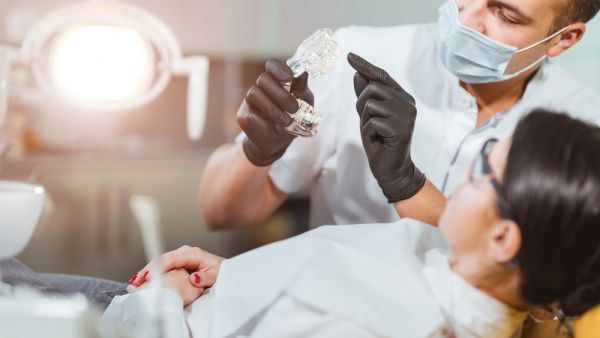A US research team has developed a revolutionary method that could eliminate one of the major problems facing titanium in the dental and joint implants.
Titanium has many properties that make it a great choice for use in implants, such as low density, high stiffness, high biomechanical strength-to-weight ratio, and corrosion resistance. However, a persistent problem plagues metal-based implants: the surface is also a perfect home for microbes to accumulate, causing chronic infections and inflammation in the surrounding tissue. Consequently, five to 10 percent of dental implants fail and must be removed within 10-15 years to prevent infection in the blood and other organs.
New research from the University of Pittsburgh's Swanson School of Engineering introduces a revolutionary treatment for these infections, by utilizing electrochemical therapy (ECT) to enhance the ability of antibiotics to eradicate the microbes.
The findings were published in The ACS Applied Materials and Interfaces journal.
According to a report released Wednesday on the university's website, the new method relies on passing a weak electrical current through the metal-based implant, damaging the attached microbe's cell membrane but not harming the surrounding healthy tissue. This damage makes the microbe more susceptible to antibiotics.
{"preview_thumbnail":"https://cdn.flowplayer.com/6684a05f-6468-4ecd-87d5-a748773282a3/i/v-i-e…","video_id":"e28516d2-be17-4d9a-aa1a-16e49deb8ab7","player_id":"8ca46225-42a2-4245-9c20-7850ae937431","provider":"flowplayer","video":"Lebanese Protestors Barricade Roads, Press Demands for Hariri Resignation"}
Since most antibiotics specifically work on cells that are going to replicate, they do not work on dormant microbes, which is how infections can recur. The ECT causes electrochemical stress in all the cells to sensitize them, making them more susceptible to antibiotics.
Researchers focused their research on Candida albicans (C. albicans), one of the most common and harmful fungal infections associated with dental implants.
The study lead author Tagbo Niepa, professor of bioengineering, told Asharq Al-Awsat by email: "We proved that our treatment is effective on many types of microbes, working against Gram-positive and Gram-negative bacteria, and we ultimately emphasized its efficacy against yeast cells."
This treatment deals with infection as soon as it detects it, and can be used to prevent the spread of microbes, stresses Niepa.
The team's next step is to move from laboratory experiments to designing relevant animal models in order to prove the method's effectiveness in vivo, and then to the human application phase. Dr. Niepa expects these steps will be made quickly, so that this treatment becomes commercially available "very soon."
This article has been adapted from its original source.








